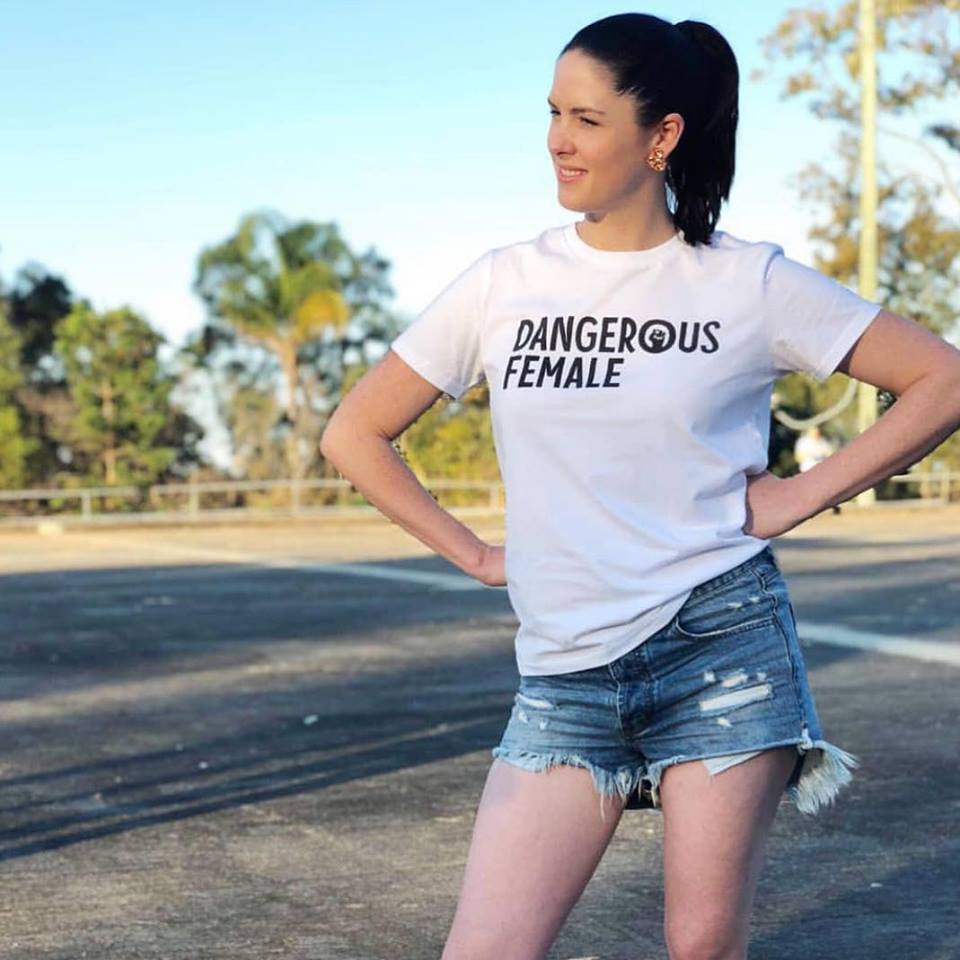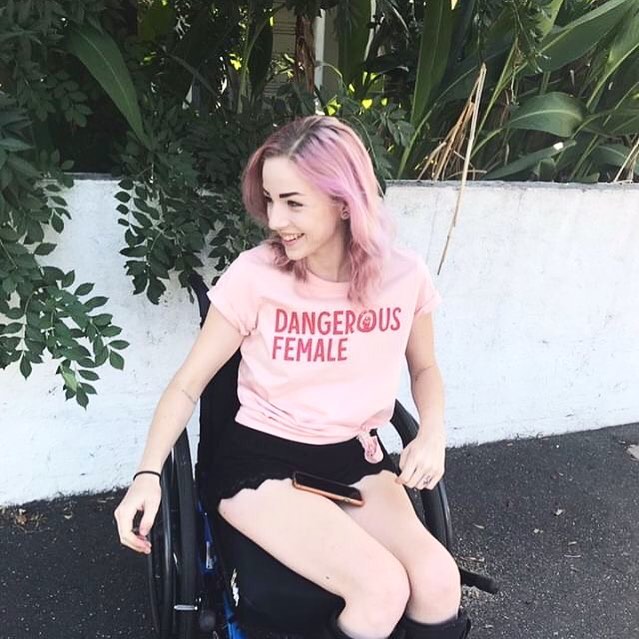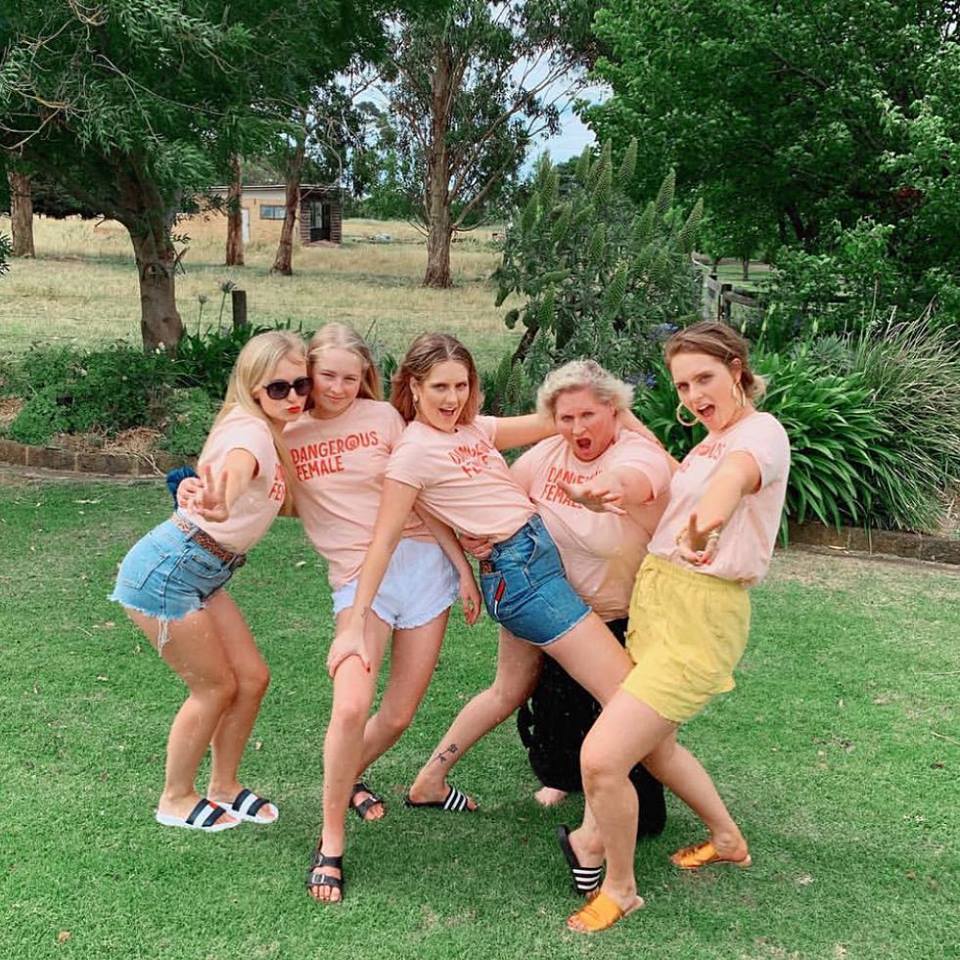Dangerous Females: T-shirts that help women fight violence and sexual abuse
The brutal rape and murder of Eurydice Dixon in Melbourne last year became the catalyst that changed the tone and tenor of the conversations surrounding violence against women – imbibing them with a sense of urgency and seriousness. In 2018, 69 women were murdered; a majority of them by their husbands, current or former partners, while this year alone seven women have already lost their lives in similar acts of violence. The statistics become grimmer in aboriginal communities, with indigenous women 32 times more likely to face family violence compared to non-indigenous women.
The terrible statistics along with the murder of Israeli student Aiia Maasarwe earlier this year forced Australian women to take a stand. Last month, thousands of activists, domestic and sexual abuse survivors, among others, took to the streets urging concerned authorities to go beyond bland platitudes and vocalised the need for a safer society for women, ethnic minorities, and the LGBTQI community.
Among those making a difference, Brisbane based initiative Dangerous Females stands tall. An online T-shirt store run by a women’s collective, Dangerous Females donates 100 per cent of the profits to organisations that support and help women battling domestic violence and sexual abuse.
In conversation with TAL, Jasmin McLean, one of the members of the collective speaks about the organisation’s guiding principle of ‘Don’t do nothing, do something’, reclaiming the term ‘Dangerous’, and the importance of speaking up for those who are in trouble.
Who are the founders of this initiative and why the use of the term ‘Dangerous’?
The women’s collective behind Dangerous Females comprise Jes Hallagan, small Business owner @thegoodthingthings and mother of two kids, Jasmine McLean, Accountant and mother to a little one, and Cath Moss, Social Worker and mother of two.
We call ourselves Dangerous Females because we want to reclaim the word danger - a term that is often used to restrict and silence women. We are always told that it’s too dangerous to be out alone at night, to be on our own, to wear a specific type of attire. Ironically, statistics point out that, sometimes for women, even home can be a dangerous place.
Through this initiative, we want to raise money for incredible organisations that support women to live a life free of violence. We believe we can inspire, look after and give each other the confidence to be heard.
When did you start the organisation and where? Apart from the alarming statistics of crime against women, what prompted you to start Dangerous Females?
Dangerous Females was started in mid-2018, in Brisbane where we all reside.
Jes is the 'godmother' of the collective which was initiated following the tragic and violent death of Eurydice Dixon. She posted a heartfelt note on Instagram stating that as a woman she couldn’t just sit idle, while stories like Eurydice’s continued to dominate the headlines.
She wanted to be proactive and join the voices that were clamouring for a safer society for women. The post touched a chord with Cath and me, and we immediately joined in!
As women we are all accustomed to the dangers that lurk in our cities – from looking over our shoulders constantly while walking at night to feeling uncomfortable getting into cabs alone, the list is endless. And, for many women, that threat of violence follows them home as well.
In 2019, in a developed country like ours, the fact that we continue to battle this persistent fear is unacceptable.
Please take us through the process of setting up the collective, was it an easy journey or did you have to overcome a lot of stumbling blocks?
Once the three of us came together, the collective gained momentum quickly. Jes knew our amazing suppliers, The T-shirt Mill located here in Brisbane. She proposed a plan to develop our brand and sell T-shirts with the entire proceeds going to charities doing remarkable work in supporting victims of domestic violence and sexual abuse.
We then reached out to graphic designers, built our website, and researched fundraising laws and potential recipient charities. The first few months were tough - getting the T-shirt design right, setting the paperwork in place, and managing some initial scepticism of our legitimacy.
But within a couple of months, we launched through Instagram, and the community around us has been consistently growing since then.
Currently, how many organisations do you support? How do you ensure that an organisation you are helping is legitimate and aligns with your collective’s goals?
At present we are supporting two charities for six months. We were clear that we didn't want to register as a charity ourselves, as we are doing this as volunteers and not full time. Also, there are plenty of existing organisations doing incredible work that just need additional funds directed their way.
As we operate under the legislation for appeals (not being a charity ourselves), we are only able to support some individual aid organisations for a limited time, but this enables us to share the love around!
In choosing our recipient charities, we look for community-based groups, as opposed to larger, more bureaucratic organisations, who provide direct crisis/counselling/accommodation support to victims as well as education programs.
Violence against the members of the LGBTQI community and those who identify as gender neutral are also considerably high, do you donate or associate with organisations that support them as well?
We do look for organisations that provide specific support for minorities like LGBTIQ+ and Indigenous Australians as they are often, unfortunately, the most at-risk in our community.
As a Social Worker, Cath has a vast network of amazing colleagues across the country who have recommended legitimate and well-loved charities, and we have also put a call out on our Instagram for suggestions from our followers.
Who came up with the statement design for the T-shirts? And, what is the reason behind the limited designs?
Our 'brand' was the brainchild of Jes, but we all collaborated on the final T-shirt design until we felt we'd hit the mark. We are now working with some Australian artists to launch limited edition collaborative T-Shirts soon. Watch this space!
Why did you stick just to T-shirts, and not venture into other types of clothing?
We started out just with T-shirts because we wanted to keep things simple for the launch. And, since it is a voluntary gig for us, we didn’t want to go overboard by taking on more than we could manage.
In all honesty, initially, we weren't sure how quickly the project would gain momentum or how far it would go. However, given our ever-growing support base, we feel confident enough to launch newer items and recently introduced hats to our collection.
We are also working with our supplier on a few other clothing items for winter.
As a women’s collective that has embraced the word ‘dangerous’ like third wave feminists are reclaiming words like ‘slut’ and ‘bitch’, and supporting the organisations you do, do you ever get branded as Feminazis – another word used today to quieten women? How do you respond to such taunts and criticisms?
We have been trolled time and again, and it can be quite disappointing. We don’t understand the hate, and if we come across a rude and abusive message, or a criticism that is not constructive but is intended to derail our objective, we merely block them on social media.
People who take the time out of their day to look for our account, and then write hateful, vulgar or condescending comments aren't worth responding to or attempting to reason with. We just move on.
Are you open to supporting organisations that help male victims too?
While we are about equality and would never choose not to support an organisation because they support male victims, our priority is to back groups most at risk in our community, which – as the statistics show- are women, ethnic minorities and those who identify as LGBTIQ+.
How many shirts have the collective sold till now? And, how much funds have you raised for various organisations?
It's difficult for us to know the number of T-shirts sold. The analytics from our site track the number of orders, but the rough estimate would be 1200 shirts.
In the first six months of our operations -July to December 2018- we raised over $22,600 for our two nominated charities. This was through T-shirt sales, and the online auction held last November.
If 100 per cent of the profits go to other NGOs, how do you get the capital to buy the T-shirts that are sold on the website? And, do all members of the collective work on a voluntary basis?
Our site is directly linked through to our supplier, The T-shirt Mill who makes-to-order the shirts in Brisbane and ships them out to our customers.
This means we have no costs to cover for product or postage and can donate all profits directly to our charities. There would have been no Dangerous Females without their support.
All three of us work on an entirely voluntary basis.
Do you think there is an increase in awareness and acceptance that violence against women is a brutal reality that should be handled swiftly?
Awareness is increasing, but we still have a long way to go! According to the Red Heart Campaign, in 2018 about 69 women were murdered in Australia. That figure is just unacceptable!
It's a difficult and confronting problem to address, and the innate positive nature of Australians makes us blind towards the extent of the issue. Also, the horse blinder attitude of not interfering because 'it's not my business' is difficult to crack.
But I believe more people are beginning to comprehend the seriousness of the issue and are stepping up to report violence when they see it.
How has the journey been till now, and what are the future plans for the collective?
The journey so far has been immensely rewarding! We are about to launch fundraising events in Brisbane and Melbourne for our current charities which are keeping us quite busy.
We don't have an 'ultimate plan', we just want to raise awareness and funds that can be channelised to support organisations that are doing their best to help women who need it the most.
To buy Dangerous Females T-shirts, visit their website.
Connect with them on Instagram and Facebook.
If you or anyone you know needs support, read more.













